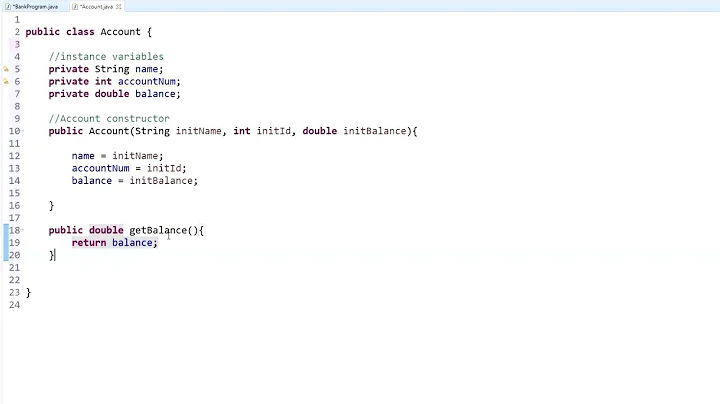Create instance of class in another class (with generic example)
Solution 1
All attributes of an instance or class are accessed via self which is passed as the first argument to all methods. That's why you've correctly got the method signature something_else(self, a, b) as opposed to just something_else(a, b) as you might with other languages. So you're looking for:
class BAR():
def __init__(self):
self.foo1 = FOO()
def something_else(self, a, b):
self.foo1.do_something(a, b)
Note that self isn't a keyword, it's just a paramater name like a and b, so you might for example be tempted to use this instead if you're from a Java background... Don't though! there is a very strong convention to use self for this purpose and you will make a lot of people (including yourself eventually) very angry if you use anything else!
With regards to passing values I'm not sure what you mean, you can access them through instances such as foo1.an_attribute or pass them as arguments to functions as in function(arg) but you seem to have used both techniques in your example so I'm not sure what else you're after...
Edit
In response to @dwstein's comment, I'm not sure how it's done in VB but here's a how you pass arguments when creating an instance of a class.
If we look at your class:
class BAR():
def __init__(self):
self.foo1 = FOO()
We can change that to accept an argument baz by changing second line to def __init__(self, baz): and then if we want we can make baz an attribute of our new instance of BAR by setting self.baz = baz. Hope that helps.
Solution 2
In python you always have to use the "self" prefix when accessing members of your class instance. Try
class BAR():
def __init__(self):
self.foo1 = FOO()
def something_else(self, a, b):
self.foo1.do_something(a, b)
Solution 3
You're on the right track, try:
class BAR():
def __init__(self):
self.foo1 = FOO()
def something_else(self, a, b):
self.foo1.do_something(a, b)
Related videos on Youtube
DBWeinstein
Co-Founder at HomeKeepr. Coding hobbyist. Always learning about everything.
Updated on June 29, 2021Comments
-
DBWeinstein almost 3 years
I'm learning python via book and internet and I'm stuck on a class issue.
2 questions:
- How do I create an instance of one class in another (separate) class?
- How do I pass variables between the class and the nested(?) class?
When I try to create an instance of a class within another (separate) class, i'm able to do so within a method. Here's the code:
import os class FOO(): def __init__(self): self.values = [2, 4, 6, 8] def do_something(self, x, y): os.system("clear") z = self.values[x] * self.values[y] print "%r * %r = %r" % (self.values[x], self.values[y], z) class BAR(): def __init__(self): pass def something_else(self, a, b): foo1 = FOO() foo1.do_something(a, b) bar = BAR() bar.something_else(1, 2)Will this, however, allow me to access the FOO class and it's information in other BAR methods? If so, how?
I tried the following and got an error:
import os class FOO(): def __init__(self): self.values = [2, 4, 6, 8] def do_something(self, x, y): os.system("clear") z = self.values[x] * self.values[y] print "%r * %r = %r" % (self.values[x], self.values[y], z) class BAR(): def __init__(self): foo1 = FOO() def something_else(self, a, b): foo1.do_something(a, b) bar = BAR() bar.something_else(1, 2)Here is the error:
Traceback (most recent call last): File "cwic.py", line 22, in <module> bar.something_else(1, 2) File "cwic.py", line 19, in something_else foo1.do_something(a, b) NameError: global name 'foo1' is not definedI get the same error when I used:
def __init__(self): self.foo1 = FOO()Also, how should I pass the 'values' from one class to the other?
Please let me know if my general approach and/or syntax are wrong.
-
DBWeinstein almost 12 yearsThanks for your thorough answer! Very helpful. I'm trying to understand how pas information from one class to another. I guess I've seen arguments as part of class definitions and I'm wondering if that's the right way. But, I don't know how to use that functionality. by the way, i've got a VBA background.








